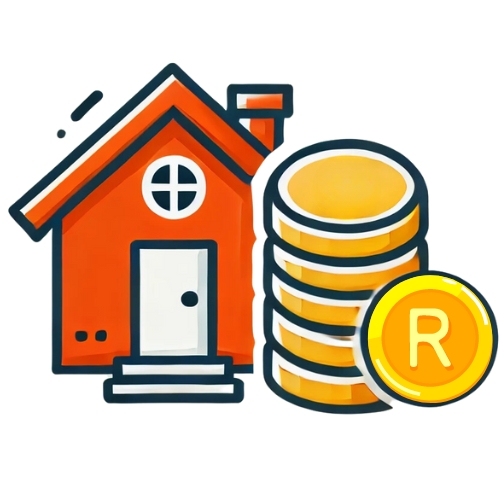Long Term Loan Solutions: What are Your Options?
Find out how long term loans can support your financial plans with lower payments and greater flexibility.
Arcadia Finance helps you in the search of loans from different banks and lenders. Fill in a free application and get loan offers from up to 16 lenders. We work with well-known, trusted and NCR licensed lenders in South Africa.
What are Long-term Loans?
Long-term loans in South Africa are those with a repayment period extending beyond three years, often lasting up to 30 years. They are characterised by larger principal amounts and longer repayment terms, making it easier for borrowers to handle substantial investments. The loan structure usually involves either a fixed or variable interest rate, which affects the total amount repayable over the loan’s duration.
About Arcadia Finance
Secure your loan effortlessly with Arcadia Finance. Enjoy no application fees and select from 10 reputable lenders, each fully compliant with South Africa’s National Credit Regulator standards. Benefit from a streamlined process and trustworthy options tailored to your financial needs.
Types of Long-term Loans

Secured vs. Unsecured Loans
In South Africa, long-term loans are classified as either secured or unsecured. Secured loans require the borrower to offer an asset, like property or a vehicle, as collateral. If the borrower fails to repay, the lender can claim the asset. These loans typically have lower interest rates because the risk to the lender is lower. Unsecured loans don’t require any collateral, but they typically have higher interest rates due to the greater risk for the lender.

Mortgage Loans
These are common secured long-term loans used mainly for purchasing property. The property itself acts as collateral, and the loan term can extend up to 30 years.

Student Loans
These loans cover tuition fees and other related expenses for higher education. In South Africa, student loans may be secured (backed by a parent or guardian) or unsecured, depending on the lender’s criteria.

Business Loans
Designed to fund the start-up, expansion, or operational costs of a business, these loans are vital for economic development. They can be either secured or unsecured, depending on the business’s financial health and the loan amount needed.
Eligibility Criteria for Long-Term Loans
Given the substantial amounts involved and the associated risks, long-term loans in South Africa are subject to stringent eligibility criteria, which can differ from those for other types of loans. Common eligibility requirements include:
- Income Verification: Applicants must show a reliable and consistent source of income to prove their ability to meet repayment obligations.
- Residency: Applicants need to be legal residents of South Africa, in compliance with local financial regulations and lending practices.
- Age: The typical age range for applicants is between 18 and 35 years, though this can vary based on the specific loan type and lender’s policies.
- Employment Status: Both self-employed individuals and salaried employees can apply, provided they meet the lender’s financial criteria.
- Guarantor: A guarantor may be required to co-sign the loan application, adding an extra layer of security for the lender.
- Minimum Income Requirement: Lenders often set a minimum income threshold to assess the applicant’s financial stability and ability to repay the loan.

Documents Required for Long-Term Loans in South Africa
When applying for a long-term loan in South Africa, individuals must provide specific documents to the lending institution for the application to be processed and approved. Requirements can vary based on the lender and the type of loan. Generally, South African financial institutions require the following documentation:
Proof of Identity
Acceptable documents include a South African ID book or card, Voter ID, Passport, or Driving License. These documents are used to verify the applicant’s identity.
Optional Guarantor Form
If a guarantor is involved, a completed form must be submitted, indicating the financial backing provided by another party in case of non-repayment.
Bank Statements
These may be requested to offer a detailed view of the applicant’s financial history and spending patterns over a specified period.
Applicant’s Salary Slips
Recent payslips are needed to demonstrate the applicant’s current financial status and repayment capacity.
Permanent Address Proof
Documents such as recent utility bills or a tenancy agreement are required to confirm the applicant’s permanent residence.
Income Statement Proof of the Guarantor or Co-applicant
If the loan is backed by another individual, proof of their financial stability and income must be provided.

Interest Rates and Other Charges
Long-term loans in South Africa generally offer lower interest rates due to the larger loan amounts and extended repayment periods. The interest rate is influenced by several factors, including the loan amount, income source, repayment term, and the individual’s credit history. Typically, as the loan amount increases, the interest rate decreases.
An individual’s credit score is a significant factor in determining the interest rate. Those with lower credit scores may face higher interest rates, as they are considered higher-risk borrowers.
For long-term loans, the interest rate can be either fixed or variable. In South Africa, interest rates usually range from 8% to 12%, depending on the loan type. It’s advisable to compare rates from different banks before choosing a lender.
Here is a summary of some common charges that banks in South Africa may apply when processing a long-term loan:
| Fee Type | Amount |
|---|---|
| Processing Fee | R700 to R2,500 |
| Stamp Duty | Fixed amount |
| Cheque Swapping | Approximately R100 per instance |
| Repayment Schedule Change | Around R200 |
| Prepayment Penalty | Typically 2% to 6% of the outstanding principal |
| Legal Fees | Non-refundable |
| Overdue EMI Interest | About 2% per month |
Benefits of Long-Term Loans
Opting for a long-term loan can be a strategic financial move for businesses with well-planned funding requirements. Here’s a detailed look at the benefits of securing long-term loans:
- Lower Interest Rates: Long-term loans often come with lower interest rates, thanks to the extended repayment terms and substantial borrowed amounts. Collateral requirements, which reduce the risk for the lending institution, contribute to more competitive interest rates.
- Maintaining Liquidity: Utilising long-term loans to cover major financial needs allows businesses to maintain liquidity. This keeps cash reserves available for operational expenses and other urgent financial obligations, helping to stabilise cash flow and alleviate potential financial strain.
- Tax Advantages: One significant advantage of long-term loans is the potential for tax deductions. Expenses related to long-term financing, such as interest payments, may be deductible, helping businesses conserve capital that can be redirected towards growth initiatives or other needs.
- Flexibility: Long-term loans offer flexibility, as they can often be tailored to fit the specific financial situation and requirements of the borrower. With a strong credit profile and the right documentation, borrowers may negotiate favourable terms, including adjustable interest rates and customised repayment schedules.
- Online Application Process: For existing customers of financial institutions, applying for long-term loans has become more convenient through online platforms. This modern approach streamlines the loan approval process, reduces paperwork, and speeds up the overall lending process, making it more efficient for borrowers.
How to Apply for a Loan with Arcadia Finance
Applying for a loan at Arcadia Finance is straightforward and accessible. Start your application by visiting our website, where our dedicated and experienced team is available to assist you with any inquiries you might have throughout the process. We will require some basic information from you, including details about your income and expenses, as well as your desired loan amount and preferred repayment term. After submitting your application, our team will promptly review the details and respond with a decision as soon as possible.
Features of Long-Term Loans
Long-Term Loan Structure
Long-term loans in South Africa are structured with extended repayment schedules, often spanning several years. These loans are carefully designed to meet substantial financial needs over a lengthy period.
Interest Rates of Long-Term Loans
In South Africa, the interest rates for long-term loans are generally more favourable compared to other types of loans. This is due to the larger loan amounts and longer repayment periods involved. Additionally, the competitive nature of the banking sector helps to lower these rates, making long-term loans more financially appealing.
Repayment Through Instalments
Repayment of long-term loans is typically done in monthly instalments over an extended period. Each instalment includes a portion of the principal amount along with interest, allowing for a gradual reduction of the debt.
Higher Borrowing Limits
Long-term loans offer significantly higher borrowing limits compared to shorter-term loans. South African banks set these limits based on the borrower’s financial capacity, enabling them to borrow larger amounts.
Requirement for Collateral
Securing a long-term loan in South Africa usually requires collateral, such as property or another valuable asset. This collateral protects the bank’s interests. If the borrower defaults, the bank can seize the asset to recover the loan amount.
Tax Advantages of Long-Term Loans
Long-term loans, including mortgage loans, offer notable tax benefits in South Africa. According to certain sections of the Income Tax Act, borrowers can claim deductions on the interest paid on these loans. For example, with a home loan, a tax deduction on interest payments up to a specified limit per year can be claimed, providing significant financial benefits.
Conclusion
Long-term loans are crucial in South Africa, supporting major personal and business investments with advantages such as lower interest rates and enhanced liquidity. These loans, which offer significant tax benefits, are especially appealing for funding property, education, or business ventures. Although they come with risks related to extended repayment periods and interest accumulation, strategically using long-term loans can contribute to financial stability and growth. As the economic environment changes, the adaptability and benefits of long-term financing may indeed play a key role in maintaining long-term economic resilience in South Africa.
Frequently Asked Questions
In South Africa, the main types of long-term loans include mortgage loans for purchasing property, student loans for higher education expenses, and business loans for funding company operations or expansion. These loans can be secured, requiring collateral, or unsecured, depending on the borrower’s financial situation and the lender’s criteria.
Interest rate changes in South Africa, set by the South African Reserve Bank, directly affect the cost of long-term loans. When interest rates rise, borrowing becomes more expensive, which can reduce the affordability of loans. Conversely, lower interest rates can make borrowing cheaper, potentially encouraging more loans by consumers and businesses.
Long-term loans provide the benefit of lower monthly payments over an extended period, making large investments more financially manageable. They generally have lower interest rates compared to short-term loans due to the longer repayment term and, in the case of secured loans, the presence of collateral.
In South Africa, certain long-term loans, such as mortgage loans, offer tax benefits. Borrowers can claim deductions on the interest paid, up to a specified limit, which can result in substantial savings over the life of the loan.
Applicants for long-term loans must show a stable income, be legal residents of South Africa, and usually fall within a specific age range. Requirements can vary by lender but typically include a credit check, proof of income, and, for secured loans, collateral. Depending on the loan type and the applicant’s financial background, a guarantor might also be necessary.


